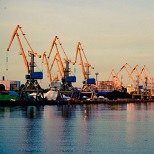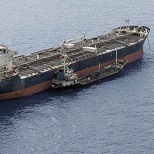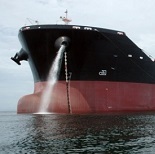Forwarder as a Carrier and Professional Agent
The increased activity of freight forwarders and the expanded diversity of their work are striking facts of modern carriage of goods. This increase is a result of the container revolution, the emergence of multimodal systems of inland carriers, terminal owners and sea carriers, the long term over-availability of tonnage in the world shipping market coincidental and the rapid and unprecedented development of the global logistics industry. Freight forwarders have fitted into this new global logistics order and hence their new importance. The up-to-date assessments say that 4/5 of general and container goods in international directions are made not by the traders but the freight forwarders and other transport agents. Moreover, the development of mixed transport force the freight forwarders to turn into the principals of the transport process as their legal status are closer to the carrier’s one. Freight forwarders may even have the rolling stock and container park. That means that they perform their duties not only formally, but act as a real carrier. For example Maersk, the largest world carrier, have in its structure the freight forwarding companies. Thus the specialization of the freight forwarding capital , separating from the transport capital in the whole and carriers’ capital in particular, doesn’t have the unilateral trend to the split-off. There is obviously a trend to interact and mutual transferability of capitals and such kind of activity. It is evident in the modern means to arrange the door-to-door deliveries.
In the context of legislation freight forwarding is of great concern as the legislative analysis is quite relevant even comparing with the researches within the operational and economic issues which are called the “logistics”. Within the transport process technical analysis is very important too. However, we’ll dwell on the legal relations between the freight forwarder and the goods owner. We aren’t able to shed light also on other specialized transport undertakers – post freight forwarders, but their relation are worth the separate analysis.
The Ukrainian integration into the world economy makes such analyses pressing.
Freight forwarder: agent
A freight forwarder, forwarder, or forwarding agent is a person or company that organizes shipments for individuals or other companies and may also act as a carrier. A forwarder is often not active as a carrier and acts only as an agent, in other words as a third-party (non-asset-based) logistics provider that dispatches shipments via asset-based carriers and that books or otherwise arranges space for these shipments. In Ukraine the carrier and freight forwarder became the different notions quite recently. Freight forwarding was stipulated in the national legislation. However, Ukrainian legislation tends to Romano-Germanic continental legal framework where agency services are not so well-developed as in Anglo-Saxon one. Freight forwarding services have so much peculiarities, that analysts always had troubles to specify their nature. They divide them into two types of services: legal and material. So what is the freight forwarding? They was forced to point out the special type of services combining legal and material specifications.
Agency agreement is typical both for England and the USA. We’ll give the detailed analysis of practical issues and legal regulation of such agreements (contracts). In English and American jurisdiction have used to the principle that the agency agreement is about the performance by the agent both legal and real actions to establish the contractual obligations between principal and the third party. In case of freight forwarder-agent – between the carrier and the cargo owner.
Freight forwarder as agent is every physical or moral person working in the name and for the account of his mandatory (generally the exporter or the importer), executing his instructions without having the opportunity to choose methods and means of transportation.
The form of the agreement between the agent and the principal doesn’t matter. The agreement may be written, oral or implied. Here we see the gratuitousness presumption except the performing the agency actions as a business, which is customary for the freight forwarder. That’s why freight forwarding contracts should be presumed as refundable even not mentioning the freight forwarder’s remuneration in the contract.
To establish the principal’s obligations the freight forwarder should act within his authorities – direct or implicit. Implied authority is the implied ability of an individual to make a legally binding contract on behalf of the principal. Express authority is an actual, distinctly stated (not implied) specific, authority given by a delegator or principal to his or her delegatee or agent, through oral or written, or partly-oral and partly-written, words. If the principal wishes to conclude a deed, the authorities should be clearly stated there. The implied authority also include the apparent authority which exists where the principal\'s words or conduct would lead a reasonable person in the third party\'s position to believe that the agent was authorized to act, even if the principal and the purported agent had never discussed such a relationship. This is sometimes termed "agency by estoppel". Authority by necessity is the part of implied authority, which appears within the following:
а) commercial situation where the additional authority is needed to protect the principal’s interests;
b) agent aren’t able to obtain the principal’s instructions.
Even if the contract is gratuitous, which is ruled out, the principal is obliged to cover freight forwarder’s costs. On default, the agent is entitled to obtain the payment at the moment when the deal with the third parties is closed. However the principal may cover the costs after the third parties have performed their obligations, under the agreement with the freight forwarder. Such agent is called a del credere agent.
British International Freight Association have elaborate popular and clear Standard Trading Conditions (STC), 1989 version (BIFA STC 1989).
Freight forwarder: principal
The freight forwarder’s activity is usually considered as the professional and qualified. Especially today when the freight forwarder act both as agent and principal. It makes him close to the carrier. The abovementioned BIFA STC 1989 foresee this freight forwarder’s role.
Initially it was the road carrier who rendered freight forwarding services. Today there is a certain category of “quasicarriers” who are, basically, the freight forwarders without their own vehicles but bearing the whole liability for door-to-door delivery. They are NVOCC (non vessel operating common carrier) - US designation for a shipment consolidator or freight forwarder who does not own any vessel, but functions as a \'carrier\' by issuing its own bills of lading or air waybills and assuming responsibility for the shipments..
Freight forwarder as principal is every physical or moral person working in his own name for the account of his mandatory (generally the exporter or the importer), undertaking to offer services and deliver goods to destinations and having the opportunity to choose the mode and means of transport against fixed remuneration who will receive it from his mandatory. A professional working in his name and collecting a fixed remuneration determined upon mutual agreement with his mandatory, not obliged to submit a management detailed report to his mandatory contrary to the agent. During the forwarding process, the freight forwarder carries out financial and legal activities and is in charge of contracting carriers, port administration, customs administration and insurance companies upon request of his mandatory, in order to facilitate his function.
Moreover, if the contract with a freight forwarder acting as a principal provides a commission fee (brokerage), the court will never recognize it. Judge Donaldson declared the reference on commission fee as equivocal and regarded the remuneration of the freight forwarder acting as a principal as the general price of his services (Salsi v. Jetspeed Air Services Ltd case).
STC 1984 lack the presumption of freight forwarder acting as an agent, in contrast to the previous version of 1981. You see, the Trade Conditions are adjusted to the modern needs. The great question: “Freight forwarder: principal or agent?” is aggravated by the Bill of Lading Conventions which introduce the difference between the actual and the contract carrier. That brings confusion between the cargo owner and the freight forwarder. However, one fact is clear: the freight forwarded concluded a contract as a principal-carrier, is not a usual carrier.
When the place of breaking the contract is clearly defined and the breaking is attributed to certain mode, the so called network provision is applied. The freight forwarder’s liability is defined as if he concluded the separate contract for the relevant part of carriage. Such cases are the most popular (80%) in claims to the freight forwarder. But sometimes the place of infringement is unknown, e.g. in container delivery. In this case the direct multimodal transport contract is applied and the freight forwarder’s liability should be defined according to it. The rules, defining such liability, are called the integrated liability system.
The confusion aroused from the network provisions lead to the elaboration of United Nations Convention on International Multimodal Transport of Goods (Geneva, 24 May 1980). The compromise provision (Art. 19) states: when the loss of or damage to the goods occurred during one particular of the multimodal transport, in respect of which an applicable international convention or mandatory national law provides a higher limit of liability than the limit that would follow from application of paragraphs 1 to 3 of article 18, then the limit of the multimodal transport operator\'s liability for such loss or damage shall be determined by reference to the provisions of such convention or mandatory national law. Thus, the network provision is applied only to the freight forwarder’s liability limit which can’t be lower than the mandatory one. In other cases Convention eliminated the network provision. That was the reason why so many states rejected the Convention – they consider it as a departure from the traditional rules regulating transport by different modes, which is the benefit for the cargo owner. The compromise also tends to increase the liability limit for the carrier and the freight forwarder. The opponents of the network liability emphasize that the higher liability limit for the freight forwarder is aimed at extra protection of owner’s interests. The network liability allows the freight forwarder to apply the binding law providing the lower liability limits that in the above Convention.
As you see, there quite complicated relations between the freight forwarders and the cargo owners which confuse the precedents. Freight forwarders are competent experts (in most cases) thus they think their relations with the customers are settled by the law. Yes, modern legislation protects the freight forwarder’s rights. But the abstrusities of their rights protection are very complicated and hard to realize. Therefore both cargo owners and freight forwarders need the support of legal adviser. Obviously, it is the best way to be sure in your future.
(1).png)
Cargo transportation by sea is one of the most reliable and most expensive methods of goods delivery worldwide. Sea lines are one of...

A NEW INITIATIVE BY THE MINISTRY OF TRANSPORT AND INFRASTRUCTURE The new regulation that entered into force in 28 April 2021 has impo...

Dear colleagues, Here is Quarterly Shipping newsletter broght to you by Interlegal. Let us present the most valuable cases and n...

The issue of the port and berth safety is among those which raise various disputes between the interested parties. As the reasons for declar...

Although travel restrictions are beginning to ease, there are still restrictions in many countries impacting on crew changes. The new clause...
 Ship arrest in Ukraine: new approaches2020.06.18
Ship arrest in Ukraine: new approaches2020.06.18The concept of one shipowner – one vessel The concept of one shipowner – one vessel arose due to shipowners’ reasonable desire to secure...

Task The Client – large bunkering company making business in Black Sea Region – applied to Interlegal for debt recovery for bunker supply...

Dear Interlegal clients, Please be informed that in the third quarter of the 2019 year significant changes of Ukrainian legisla...

A presidential decree has been published in the official gazette on 03.05.2019 marking the date on which the 1999 Convention officially beca...
 LMAA arbitration notice clause2019.02.27
LMAA arbitration notice clause2019.02.27The LMAA has published a clause for use in arbitration agreements to facilitate effective notice by email (including for commencement of arb...





 Odessa, 65014, Ukraine, 1 а, Gretska St
Odessa, 65014, Ukraine, 1 а, Gretska St
